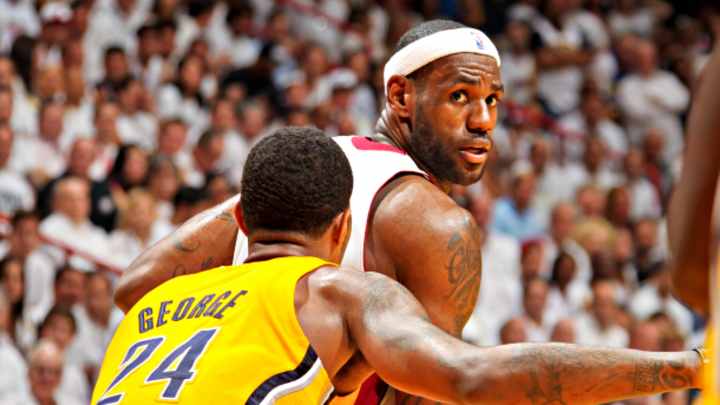LeBron James is right: 'There is no real rivalry in the NBA these days'

Despite the rise of Paul George and the Pacers, LeBron James doesn't Indiana to be Miami's rival. (Issac Baldizon/NBAE via Getty Images)
The word "rivalry" is a sacred one in sports, used to invoke a specific and powerful bond between two adversaries. It's also used haphazardly to leech off the appeal of the real; rivalries are so enjoyed and so coveted that we tend to look for them everywhere. Players selected in the same draft class, playoff opponents who grow a bit testy, any similarly skilled players at the same position -- all are tabbed as budding rivals. It's an understandable urge to label them as such, given the rush that comes with that particular dynamic, but in an NBA world where rivalries are increasingly rare (if they still exist at all), the inclination seems a bit silly.
That won't stop talk of supposed rivalries forming or halt questions as to whether this or that qualifies as one. On Tuesday, Miami's LeBron James was asked about his team's relationship with the Pacers -- just as Derrick Rose was -- and in response he unpacked the entire concept as it relates to today's NBA (via Joseph Goodman of the Miami Herald):
“What is a rivalry these days?” James countered when asked if the
Heat
and Pacers shared a rivalry. “What’s a rivalry? A rivalry is
Celtics
and
Lakers
. They met like four out of five years. …
Bulls
-
Pistons
. Those are rivalries, man.
“We’ve played these guys two straight years in the playoffs, and guys automatically make it a rivalry. It’s not a rivalry.”
...“There is no real rivalry in the NBA these days,” James said. “You don’t see the competition enough or play the competition a lot. It’s two really, really good teams that [are] striving to win a championship, but rivalries … there are no more rivalries. There isn’t. It’s the truth. No rivalries.
James seems to be right. While there are no iron-clad criteria for what makes a rivalry, no NBA matchup much measures up to the touchstones of the genre. As James later put it: “Cowboys-Redskins is a rivalry. Ohio State-Michigan is a rivalry. Duke-North Carolina is a rivalry. Bears-Packers is a rivalry.” Even the most heated pairings in the NBA might simply be something else -- entertaining still, but less absolute. It's a wildly entertaining league that doesn't lack for intensity in its matchups, but the current state of pro basketball competition has taken on its own particular hue.
As James noted, perhaps this is simply a matter of frequency. The most two NBA teams can play each other is 11 times a year between the regular season and playoffs, with the far more likely outcome being 2-3 meetings staggered over the course of six months. It's hard to build the ill will necessary for true rivalry under those circumstances, no matter if the underlying qualities might be in place to engender one.
It also doesn't help that basketball players are connected early and more often than they were in the past, linked by a few degrees of separation in the national AAU network throughout their teenage years. These are players who grew up together or grew up idolizing those who came before them, all of which makes the vilification of a certain opponent that much more difficult. It's hard to develop a bunker mentality when the bad guy is an old friend knocking at the front door.
There has long been some level of respect between NBA peers, but that respect now comes in more amicable form than ever. Would-be antagonists share summer workouts and learn from one another. They have dinners or host each other's families. There's room for a more nuanced relationship between players that rivalry may not allow. By form, a rivalry tends to reduce the players involved to flat-toned characters, even more than the lore of the game already does. But how could we make sense of today's stars in that template when so many are hyper-competitive players with more complicated relationships to their contemporaries?

Rob Mahoney is an NBA writer dedicated to the minutiae of the game of basketball, its overarching themes and everything in between. He joined the Sports Illustrated staff in 2012.